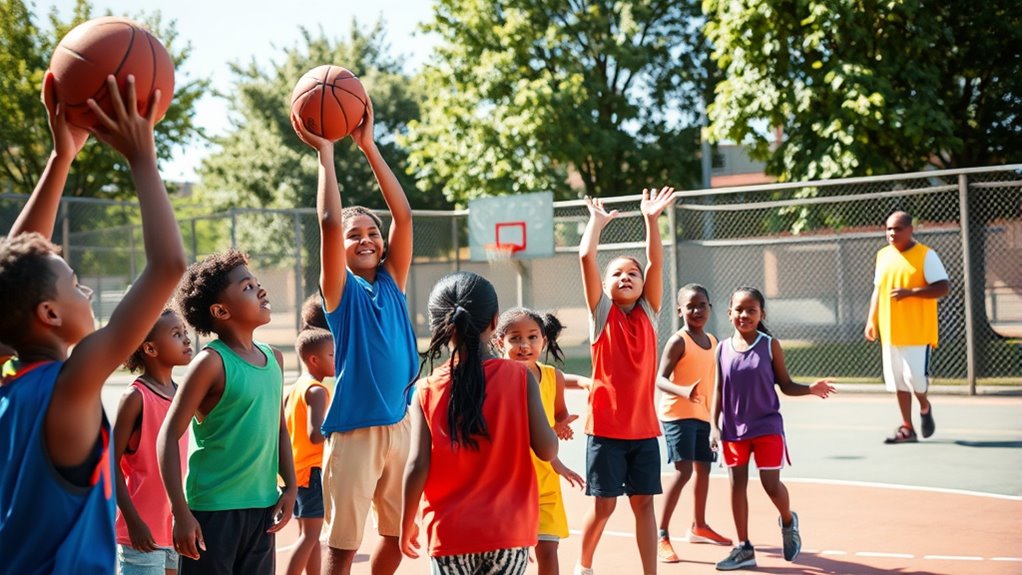Using sports for outreach helps you build stronger communities by fostering unity, pride, and shared spaces. You can promote important values like teamwork, resilience, and respect through youth programs that develop skills and character. Partnering with schools or nonprofits amplifies your impact and reaches underserved groups. Host events that raise awareness for social issues or inspire change, and always measure your success to guarantee sustainability. Keep exploring how sports can strengthen your community even further.
Key Takeaways
- Leverage sports events and tournaments to raise awareness and promote social causes effectively.
- Partner with schools and nonprofits to expand outreach and provide resources for underserved communities.
- Use athlete endorsements and mentorship programs to inspire youth and foster positive community engagement.
- Incorporate themed game days and halftime shows to highlight social issues and encourage community dialogue.
- Measure impact through participation, feedback, and sustainability metrics to ensure long-term effectiveness of outreach efforts.
Building Community Through Local Sports Initiatives
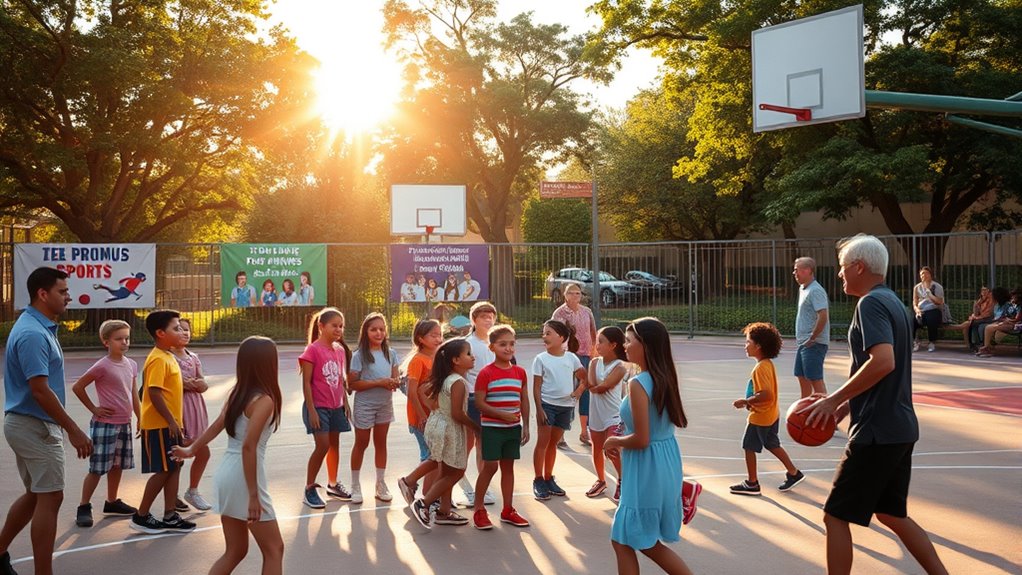
Local sports initiatives have become powerful tools for bringing communities together. Through sports philanthropy, you can support local teams, facilities, and programs that foster unity and pride. These efforts show that investing in sports benefits everyone, creating shared spaces where people connect beyond competition. Athlete mentorship plays a vital role by inspiring youth and fostering positive relationships between athletes and the community. When athletes actively engage in mentorship, they demonstrate leadership and commitment, strengthening community bonds. Your involvement in organizing local sports events or supporting athlete-led programs helps build a sense of belonging. As a result, residents feel more connected, motivated, and invested in their community’s growth. Local sports initiatives truly serve as a foundation for lasting community cohesion.
Promoting Values and Skills via Youth Sports Programs
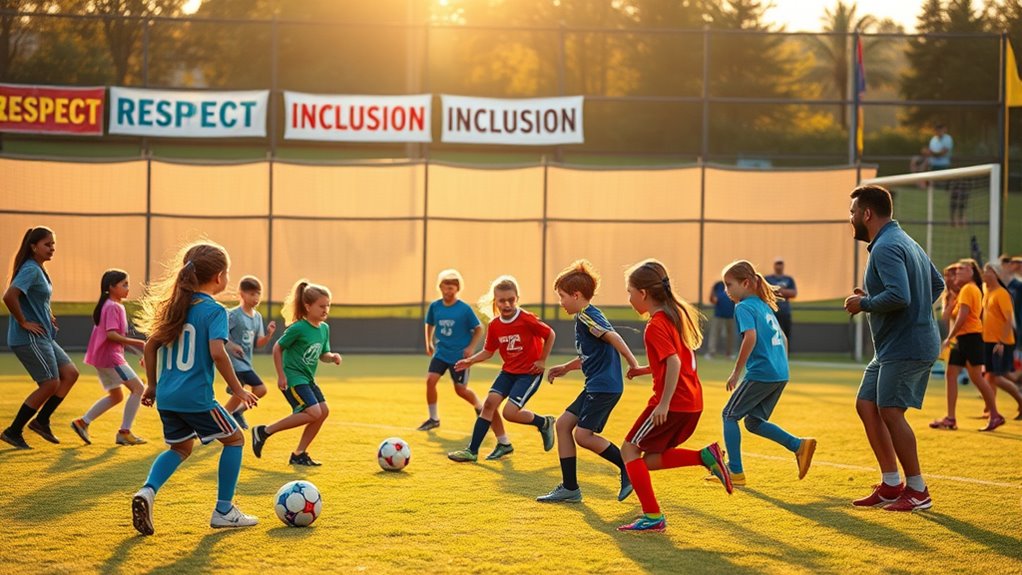
Youth sports programs are powerful platforms for teaching important life values and developing essential skills. By participating, you foster team spirit, resilience, and sportsmanship, which translate beyond the game. These programs also enhance leadership development, encouraging players to take initiative and motivate others. To visualize these benefits:
| Values | Skills |
|---|---|
| Team spirit | Communication |
| Respect for others | Problem-solving |
| Fair play and integrity | Goal setting and discipline |
Focusing on these areas helps youth build character and confidence. As you promote these principles, you create an environment where young people learn to collaborate, lead, and persevere—traits that serve them well throughout life.
Collaborating With Schools and Nonprofits for Greater Impact
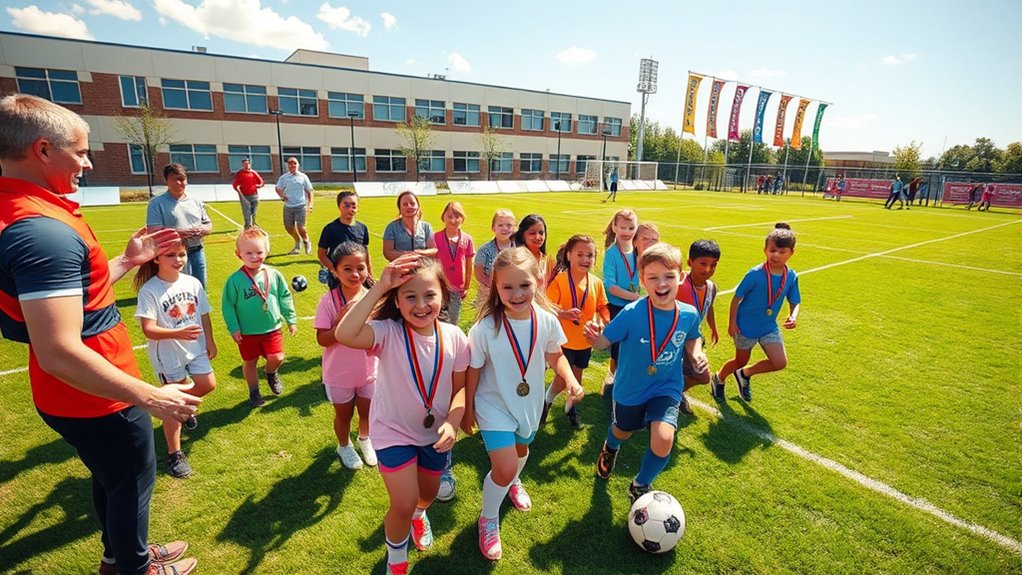
Partnering with schools and nonprofits amplifies the reach and effectiveness of youth sports initiatives. By securing sports sponsorships, you can provide essential resources like equipment, facilities, and funding, making programs more accessible. Collaborating with these organizations also opens opportunities for athlete mentorship, where experienced athletes inspire and guide young participants. These partnerships create a supportive environment that encourages skill development and personal growth. Engaging with schools ensures your programs integrate seamlessly into educational settings, while nonprofits help extend your outreach to underserved communities. Together, these collaborations foster a sense of community and shared purpose, making sports a powerful tool for positive change. Your combined efforts can build lasting relationships that benefit both youth and the broader community.
Using Sports Events to Address Social Issues
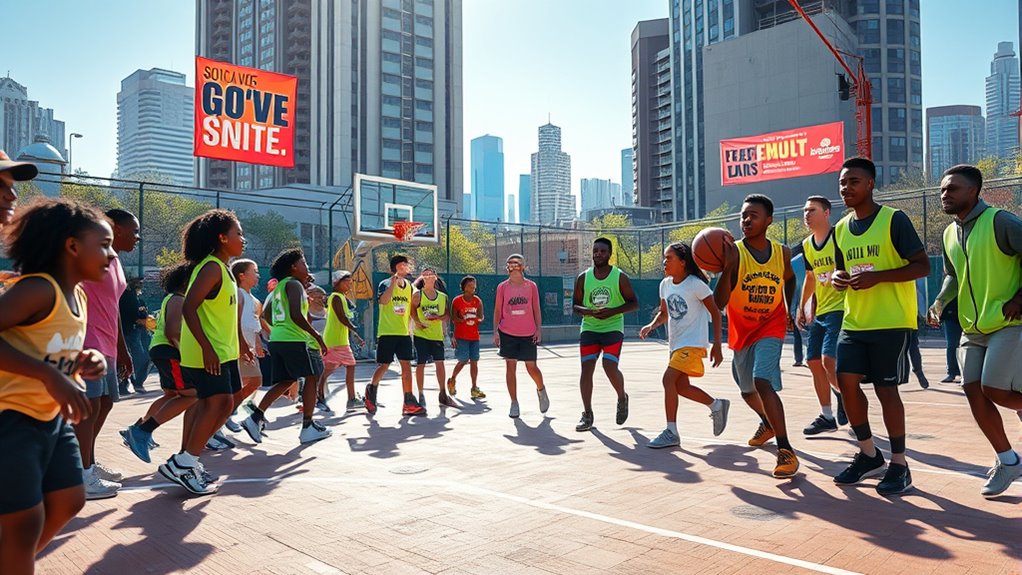
Sports events offer a dynamic platform to raise awareness and foster dialogue around pressing social issues. By leveraging stadium sponsorships, you can highlight causes and generate visibility among diverse audiences. Partnering with brands through stadium sponsorships helps amplify messages related to social justice, environmental concerns, or health initiatives. Additionally, athlete endorsements serve as powerful tools; when athletes speak out or support campaigns, they inspire fans and create meaningful conversations. You can organize themed game days or halftime shows focused on specific social issues, making the event more impactful. This approach not only draws attention to critical topics but also encourages community engagement. Using stadium sponsorships and athlete endorsements strategically allows you to turn sports events into catalysts for social change.
Measuring Success and Sustainability in Outreach Efforts
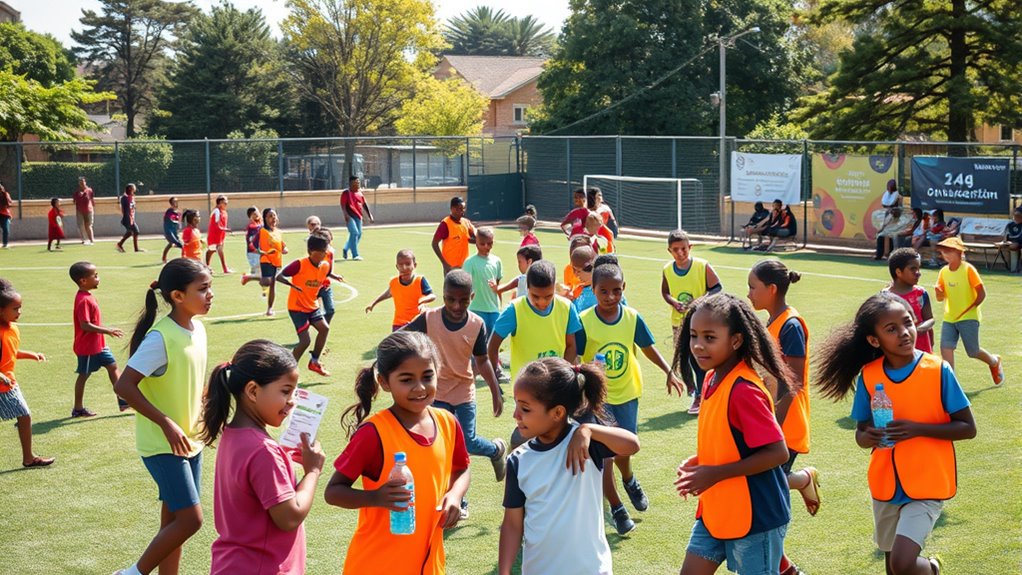
To guarantee your outreach efforts resonate and create lasting impact, you need effective ways to measure success and assess sustainability. Start with impact assessment, which helps you evaluate how your initiatives influence your target community. Next, consider funding strategies that ensure long-term viability; tracking funding sources and expenditures reveals what sustains your programs. Finally, focus on ongoing engagement metrics, such as participation rates and community feedback, to determine if your outreach remains relevant. By regularly analyzing these areas, you can identify strengths and address weaknesses, ensuring your efforts deliver meaningful change. Clear measurement methods enable you to demonstrate success to stakeholders and secure continued support, ultimately making your outreach sustainable and impactful over time.
Frequently Asked Questions
How Can Sports Outreach Programs Adapt for Different Cultural Contexts?
You can adapt sports outreach programs by emphasizing cultural sensitivity and sport customization. First, learn about the local customs, traditions, and values to guarantee respectful engagement. Then, tailor activities to fit the community’s preferences and available resources. This approach helps create inclusive environments where participants feel valued and understood, fostering stronger connections and meaningful impact across diverse cultural contexts.
What Are Effective Strategies for Engaging Reluctant or Marginalized Communities?
Think of engaging reluctant or marginalized communities like planting seeds in tough soil—you need patience and care. Focus on inclusive participation, making everyone feel valued and heard. Practice cultural sensitivity by respecting traditions and understanding barriers. Use relatable activities and approachable communication to build trust. By fostering an environment where everyone feels safe and included, you create a space where reluctant participants are enthusiastic to join and grow together.
How Do Sports Initiatives Ensure Long-Term Community Engagement?
To guarantee long-term community engagement, focus on youth empowerment and infrastructure development. You should create programs that inspire young people, giving them leadership opportunities and skills that foster a sense of ownership. Invest in local infrastructure, like sports facilities, to build a sustainable environment for ongoing participation. By maintaining consistent support and adapting initiatives to community needs, you help foster lasting relationships and continuous engagement over time.
What Funding Sources Are Available for Expanding Sports Outreach Projects?
You can tap into various funding sources to expand sports outreach projects, such as sponsorship opportunities from local businesses and corporations. Additionally, applying for grants through government agencies or nonprofit organizations can provide significant support. By actively pursuing sponsorship opportunities and submitting well-crafted grant applications, you guarantee your project gains the necessary financial backing to grow and reach more community members effectively.
How Can Technology Enhance Sports-Based Outreach and Engagement?
Oh, sure, technology will totally turn you into a pro athlete overnight. But honestly, virtual coaching and wearable technology can genuinely boost your sports outreach efforts. You can reach more people remotely, personalize training programs, and track progress in real-time. These tools make engagement more interactive and accessible, breaking down barriers. So, embrace virtual coaching and wearables—they’re not just gadgets, but game-changers for connecting with your community effectively.
Conclusion
So, next time you think sports are just about winning or entertainment, remember they can also be powerful tools for change. Ironically, the same games that often divide can unite communities and tackle social issues. By harnessing the spirit of teamwork and competition, you hold the potential to inspire real, lasting impact. After all, what better way to score points for society than through the game everyone loves to play?

